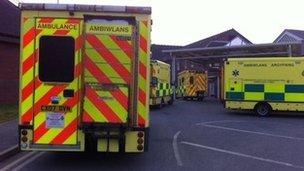Mark Drakeford pledges over hospital discharge delays
- Published

Ambulances have been forced to queue outside hospitals
Patients in Wales have been told they will not be allowed to stay in hospital in future while the NHS and social services argue over who pays for care.
Health Minister Mark Drakeford said patients should leave as soon as they can, and not continue to occupy beds.
He was setting out measures to ease pressure on hospitals after a spike in demand for emergency services.
A&E consultants have warned that their departments are at "meltdown" point due to overcrowding and a bed shortage.
In a statement to Assembly Members, Mr Drakeford said problems at the "front doors" of hospitals were made worse when beds were occupied by patients who remained in them after they were ready to be discharged.
He promised a change in policy for cases when the health service and social services departments cannot agree on who is responsible for funding care.
Such people should be transferred to a "suitable out of hospital setting," he said, adding: "They should not, and in future will not, remain in hospital until the financial issue is resolved."
In some cases patients were still in hospital because they were waiting for a place to become available at a home of their choice.
Such people should go to interim accommodation, Mr Drakeford said.
"Of course, anyone must have the right to pursue the long-term care arrangements which are best for them.
"That does not, and cannot, amount to a right to occupy an acute hospital bed while those arrangements are being realised."
Financial disputes
AMs heard that 275 acute hospital beds were occupied by patients in Wales - 57 of them by people exercising their choice to wait for a home and 20 of them by people waiting for financial disputes over their care to be resolved.
Recent months have seen a big increase in demand on hospital A&E departments.
Figures obtained by BBC Wales show ambulances spent almost 55,000 hours waiting outside Welsh hospitals in six months.
A&E consultants have written to Mr Drakeford warning A&E departments were "at the point of meltdown".
Mr Drakeford set out range of measures designed to ease the pressure facing A&E units when he addressed AMs in the Senedd chamber. He promised:
Joint plans agreed between health boards and the ambulance service to reduce ambulance waits outside hospitals. They must be implemented immediately, he said.
Health boards will draw up plans within six weeks to improve unscheduled care outside hospital, for example out of hours GP services.
NHS and councils will be told to speed up assessments of what care people need.
The chairman of Cwm Taf Health Board, Dr Chris Jones, is being appointed to advise the minister and act with his authority.
Plans to introduce a 111 phone service for non-emergency unscheduled calls will be accelerated. It follows a consistent finding from studies that too many people turn up at A&E unnecessarily.
A "national conversation about the way in which our care services best meet the needs of an ageing population".
- Published15 April 2013
- Published13 March 2013
- Published12 March 2013
- Published5 March 2013